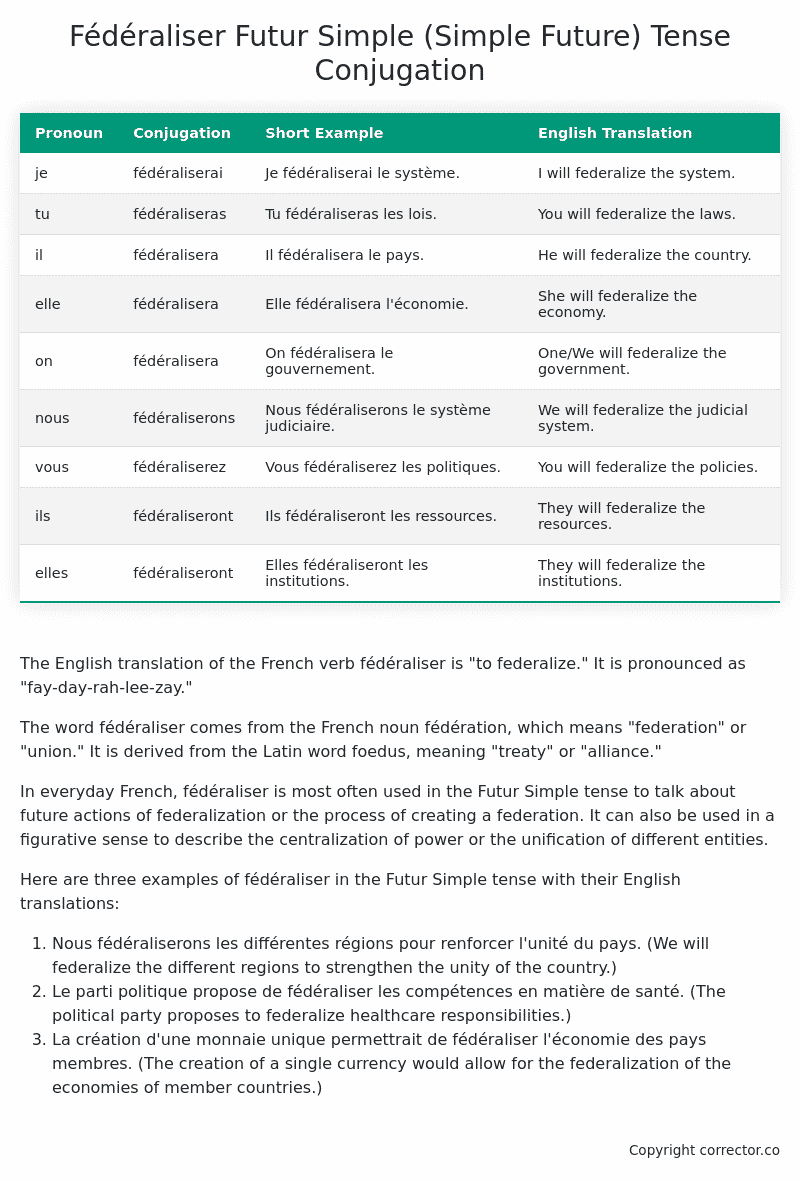Futur Simple (Simple Future) Tense Conjugation of the French Verb fédéraliser
Introduction to the verb fédéraliser
The English translation of the French verb fédéraliser is “to federalize.” It is pronounced as “fay-day-rah-lee-zay.”
The word fédéraliser comes from the French noun fédération, which means “federation” or “union.” It is derived from the Latin word foedus, meaning “treaty” or “alliance.”
In everyday French, fédéraliser is most often used in the Futur Simple tense to talk about future actions of federalization or the process of creating a federation. It can also be used in a figurative sense to describe the centralization of power or the unification of different entities.
Here are three examples of fédéraliser in the Futur Simple tense with their English translations:
- Nous fédéraliserons les différentes régions pour renforcer l’unité du pays. (We will federalize the different regions to strengthen the unity of the country.)
- Le parti politique propose de fédéraliser les compétences en matière de santé. (The political party proposes to federalize healthcare responsibilities.)
- La création d’une monnaie unique permettrait de fédéraliser l’économie des pays membres. (The creation of a single currency would allow for the federalization of the economies of member countries.)
Table of the Futur Simple (Simple Future) Tense Conjugation of fédéraliser
| Pronoun | Conjugation | Short Example | English Translation |
|---|---|---|---|
| je | fédéraliserai | Je fédéraliserai le système. | I will federalize the system. |
| tu | fédéraliseras | Tu fédéraliseras les lois. | You will federalize the laws. |
| il | fédéralisera | Il fédéralisera le pays. | He will federalize the country. |
| elle | fédéralisera | Elle fédéralisera l’économie. | She will federalize the economy. |
| on | fédéralisera | On fédéralisera le gouvernement. | One/We will federalize the government. |
| nous | fédéraliserons | Nous fédéraliserons le système judiciaire. | We will federalize the judicial system. |
| vous | fédéraliserez | Vous fédéraliserez les politiques. | You will federalize the policies. |
| ils | fédéraliseront | Ils fédéraliseront les ressources. | They will federalize the resources. |
| elles | fédéraliseront | Elles fédéraliseront les institutions. | They will federalize the institutions. |
Other Conjugations for Fédéraliser.
Le Present (Present Tense) Conjugation of the French Verb fédéraliser
Imparfait (Imperfect) Tense Conjugation of the French Verb fédéraliser
Passé Simple (Simple Past) Tense Conjugation of the French Verb fédéraliser
Passé Composé (Present Perfect) Tense Conjugation of the French Verb fédéraliser
Futur Simple (Simple Future) Tense Conjugation of the French Verb fédéraliser (this article)
Futur Proche (Near Future) Tense Conjugation of the French Verb fédéraliser
Plus-que-parfait (Pluperfect) Tense Conjugation of the French Verb fédéraliser
Passé Antérieur (Past Anterior) Tense Conjugation of the French Verb fédéraliser
Futur Antérieur (Future Anterior) Tense Conjugation of the French Verb fédéraliser
Subjonctif Présent (Subjunctive Present) Tense Conjugation of the French Verb fédéraliser
Subjonctif Passé (Subjunctive Past) Tense Conjugation of the French Verb fédéraliser
Subjonctif Imparfait (Subjunctive Imperfect) Tense Conjugation of the French Verb fédéraliser
Conditionnel Présent (Conditional Present) Tense Conjugation of the French Verb fédéraliser
Conditionnel Passé (Conditional Past) Tense Conjugation of the French Verb fédéraliser
L’impératif Présent (Imperative Present) Tense Conjugation of the French Verb fédéraliser
L’infinitif Présent (Infinitive Present) Tense Conjugation of the French Verb fédéraliser
Struggling with French verbs or the language in general? Why not use our free French Grammar Checker – no registration required!
Get a FREE Download Study Sheet of this Conjugation 🔥
Simply right click the image below, click “save image” and get your free reference for the fédéraliser Futur Simple tense conjugation!

Fédéraliser – About the French Futur Simple (Simple Future) Tense
Formation of Futur Simple
For regular -er verbs (e.g., parler – to speak)
For regular -ir verbs (e.g., finir – to finish)
For regular -re verbs (e.g., vendre – to sell)
Common Everyday Usage Patterns
Conditional Statements
Interactions with Other Tenses
Futur Antérieur
Conditional
Present
Summary
I hope you enjoyed this article on the verb fédéraliser. Still in a learning mood? Check out another TOTALLY random French verb conjugation!


